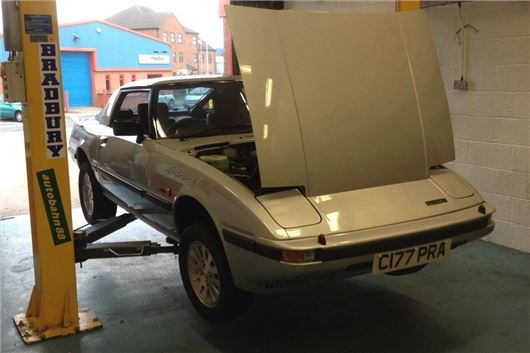Comment: If the MOT test isn’t the answer, what is?

With the Government announcing a fresh consultation into proposed changes to the MoT test for older vehicles, classic car enthusiasts are being asked to have their say. So what are the various options – and how are they likely to affect Britain’s ever-growing band of old-car owners?
Any classic vehicle built before 1 January, 1960 is currently exempt from the annual MoT test. But with this being a fixed dated, is it actually fair? After all, the Historic Vehicle taxation class is a ‘rolling’ system (allowing free-of-charge Vehicle Excise Duty for vehicles over forty years of age), so you could argue that the MoT should operate on a similar basis in the interests of fairness. This, however, raises issues about cut-off dates and appropriate ages for eligibility, not to mention safety.
So what are the various proposals being put forward by the Government? The first is simply to do nothing, leaving the system as it is. But with the UK still being a member of the EU at present, is that feasible? John Haynes MP, Minister of State for Transport, thinks not, 'Until exit negotiations are concluded, the UK remains a full member of the European Union and all the rights and obligations of EU membership remain in force. During this period the Government will continue to negotiate, implement and apply EU legislation.'
The second option is to simply remove the MoT exemption for pre-1960 vehicles, ensuring that all classic cars have to pass an annual roadworthiness inspection. The problem there, however, is making the MoT test fit for purpose when it comes to older vehicles, whose original spec is often at odds with what’s required by modern testing standards.
Another proposal is to introduce a separate safety test for Vehicles of Historical Interest (VHIs), to be taken either annually or every two years. This again raises questions, though; should the test apply to vehicles over 30 years old (to comply with the regulations throughout much of the EU) or should it be for those over 40 years (to match the current Historic Vehicle taxation class for VED)?
There is also a suggestion that instead of introducing a basic safety test for VHIs, there is simply a certification process to ensure a vehicle hasn’t been substantially altered. This could be based on self-certification, independent inspection or a combination of the two. But there are already fears over how the ‘substantially altered’ description would be applied. And if it were applied, would the classic in question simply be MoT tested the same as a modern car?
TESTING ISSUE
Here at Honest John Classics, we obviously believe that safety is crucial, and therefore don’t favour scrapping an annual roadworthiness test altogether. If any MoT-exempt classic were involved in an accident (and it was found to be at fault over an MoT-able item, such as brakes), the consequences could be dire – both for the owner of that vehicle and the reputation of the classic car movement as a whole.
The issue of insurance also arises, as to be legally insured a car has to be roadworthy; but without any roadworthiness test for older vehicles, how can this be monitored? We all know a current MoT only means that a car was road legal on the day of the test, but at least it’s an indication of the overall state of the vehicle – with any advisories highlighting potential issues ahead.
Honest John Classics readers are already having their say on this matter, particularly when it comes to EU compatibility. Howard Buchanan commented on our forum, 'Who cares if the UK isn’t compliant with EU rules between now and when negotiations following the triggering of Article 50 are concluded, sometime in the future?'
But Hugh Allan sees sense in bringing our system more in line with much of Europe’s, 'Brexit will mean Brexit it seems, so in the future it will therefore be the UK government that decides how we want to test our treasured oldies. No problem with that. However, as one might want to take it for a continental trip, it makes sense to harmonise our regulations as far as we consider it sensible to do so…'
So it’s over to you. What are YOUR thoughts on this crucial issue for Britain’s classic car owners? Let us know below. And don’t forget to also have your say on the Government’s website detailing the various proposals. To view the official documents, go to this link: www.gov.uk/government/consultations/roadworthiness-testing-for-vehicles-of-historic-interest. And once you’ve read them, click on the ‘Respond Online’ tab and make sure your voice is heard.
WHAT DO YOU THINK? Are you concerned by potential changes to the UK’s MoT system? Among the official proposals put forward by the Government, which one appeals the most – if any? Whatever your views, tell us below.
Compare classic car insurance quotes and buy online. A friendly service offering access to a range of policies and benefits.


 Keith Moody
Keith Moody
 NEC classic motor show 2020 postponed due to Covid 19 concerns
NEC classic motor show 2020 postponed due to Covid 19 concerns
 Classic car auction house Coys goes into administration
Classic car auction house Coys goes into administration
 Motor racing great Sir Stirling Moss dies aged 90
Motor racing great Sir Stirling Moss dies aged 90
 Alfa Romeo anniversary races set for Silverstone
Alfa Romeo anniversary races set for Silverstone
 Government to make E5 fuel available for classic owners
Government to make E5 fuel available for classic owners
 Plans to introduce cleaner fuel could damage more than a million classic cars
Plans to introduce cleaner fuel could damage more than a million classic cars
 Top 10: Classic cars from the Gulf motor racing heritage collection
Top 10: Classic cars from the Gulf motor racing heritage collection


